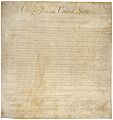Seventh Amendment to the United States Constitution facts for kids
The Seventh Amendment is a part of the Bill of Rights. It is an important rule in the U.S. Constitution. This amendment makes sure people have the right to a jury trial in certain civil cases. Civil cases are usually about money or disagreements between people, not about crimes.
The Seventh Amendment also stops courts from changing a jury's decision. This means that once a jury decides something, the judge cannot easily overturn it. This rule mainly applies to cases in federal courts. It also applies when federal courts look at state cases that involve federal laws.
A rule called the "historical test" helps decide when a jury trial is needed. This test looks back at English common law to see what was done in the past. Because of this, the amendment does not guarantee a jury trial for all types of cases. For example, it doesn't cover cases about ships and the sea (maritime law). It also doesn't cover lawsuits against the government itself. However, in most other civil cases, people can choose to have a jury or not. The amendment also says that a jury in a civil trial must have at least six members.
Contents
What the Seventh Amendment Says
In Suits at common law, where the value in controversy shall exceed twenty dollars, the right of trial by jury shall be preserved, and no fact tried by a jury, shall be otherwise re-examined in any Court of the United States, than according to the rules of the common law.
This means:
- "In Suits at common law": This refers to typical legal cases that were handled in courts in England a long time ago.
- "where the value in controversy shall exceed twenty dollars": If the disagreement is about more than $20 (which was a lot of money back then!), you have the right to a jury.
- "the right of trial by jury shall be preserved": Your right to have a jury decide your case will be protected.
- "and no fact tried by a jury, shall be otherwise re-examined in any Court of the United States, than according to the rules of the common law": Once a jury decides the facts of a case, a judge in a U.S. court cannot just change those facts. They can only review the case in specific ways that follow old legal traditions.
Why We Have the Seventh Amendment
The Seventh Amendment was approved on December 15, 1791. It was one of the first ten amendments, known as the Bill of Rights. The idea for it came from a long history in England.
Juries in England
Juries started in England around the 12th century. At first, juries were 12 men who gave their opinions in a trial. Over time, this changed. Juries began to make decisions based on evidence presented in court. This idea of a jury trial came with English colonists when they moved to the American colonies.
Juries in the American Colonies
In the colonies, juries became a way for Americans to show they were unhappy with British rule. For example, the British government had rules called Navigation Acts. These rules stopped American colonies from trading with countries like the Netherlands or France. Many colonists started smuggling goods to get around these rules.
When smugglers were caught, they often faced juries made up of other colonists. These juries often felt sorry for the smugglers and let them go free. The British king was very angry about this. So, he created new courts in the colonies that did not allow juries. This was a big problem for the colonists. They felt it took away their rights as British citizens.
Protecting Rights After the Revolution
After the American Revolutionary War, the new United States government was formed. The leaders wanted to make sure the government did not become too powerful. The Seventh Amendment was written to specifically limit the power of the president and the courts. It made sure that people would always have the right to a jury trial in civil cases, just like they had wanted under British rule.
Images for kids
-
The Bill of Rights at the National Archives
-
James Madison, who helped write the Bill of Rights
See also
 In Spanish: Séptima Enmienda a la Constitución de los Estados Unidos para niños
In Spanish: Séptima Enmienda a la Constitución de los Estados Unidos para niños
 | Jewel Prestage |
 | Ella Baker |
 | Fannie Lou Hamer |



